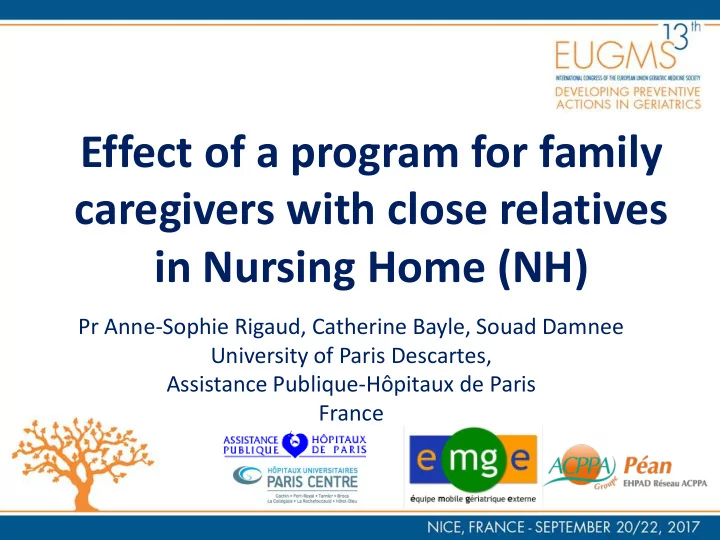

Effect of a program for family caregivers with close relatives in Nursing Home (NH) Pr Anne-Sophie Rigaud, Catherine Bayle, Souad Damnee University of Paris Descartes, Assistance Publique-Hôpitaux de Paris France
CONFLICT OF INTEREST DISCLOSURE I have no potential conflict of interest to report
Caregivers with close relatives in Nursing homes (NH) Feeling of caregivers (Givens &al 2014) • Inadequate personal care • Lack of communication with NH professionals • Challenges of surrogate decision making • Anxiety and stress Needs for: • Emotional support • Education regarding prognosis • Better communication with professionals Promising interventions in the literature (Shultz et al, 2014)
Objectives: Help caregivers understand: - Disease & institution caring management - Their own role 1 course = 7 sessions 2hours/week • Focus groups 10 -15 caregivers • Interviews Caregivers • Neurodegenerative disease & outcome • Nutrition & NH solution • Focus groups • Caregivers feelings linked to Professionals • Interviews relative in NH in NH • Institution caring management & resident day schedule • Caring until death 4
Caregivers Assessment Pre and Post with a mixed method Quantitative • CADI: : Carers Assessment of Difficulties Index (Nolan et al 1998) • CASI: Carers Assessment of Satisfaction Index • CAMI Carers Assessment of Managing Index • Competency Feeling Questionnaires Qualitative • Interviews (Braun & Clarke)
Results 16 7 15 Nursing homes Courses professionals • 80 Caregivers Mean age 67 430 • 76 %Women Followers • 5 drop-out
Results CADI CAMI CASI Ex CADI NA for me Not stresing Stressing Very stressing 0 1 2 3 Σ Rep 1, 2 et 3 % ans0 > 50% Scarce Difficulty Moy Σ ans 123 % Σ ans 1, 2 et 3 > 2 > 50% Stessing Occurring difficulty Difficulty 7
CADI: Difficulties for caregivers PRE Health POST professionals not Program understanding Financial Culpability difficulties Not enough Real help relationship Free time Sleep Quality Pause Holiday 8
CASI: Care and managing strategies Pre = Passive Post = Involving Program Accept situation Boost mind drinking, Search for smoking positive Patient responsible Participate Change one’s in support mind reading Live day after group day Calm down Anticipate by Boost mind swimming, planning drinking & walking smoking 9
CAMI: Caregiver Satisfaction POST PRE Program Give pleasure Give pleasure Maintain dignity Maintain Help = dignity expression of love Help = expression of Find small love improvements Interests & contacts 10
Competency feeling Questionnaire • Satisfied with contact with patient • Patient does not ask more than needed • I can leave the person alone • I do all that I must do 11
Qualitative analysis • Better understanding of: – Nursing home caring management – Disease: Cognitive & behavioural disorders • Improvement of: – Communication with health professionals – Relationship with relative • Decrease of emotional pain
Discussion • Limits: no randomized control trial • Advantages – 1 st program in France for caregivers with relatives in institution – Codevelopment with caregivers to meet their needs – Partnership between health and social professionals – Dissemination in Paris suburbs, Bayonne, Lyon
Thank you
Recommend
More recommend